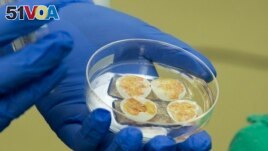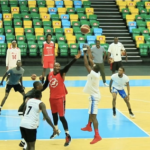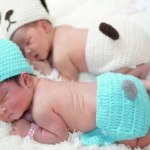Doctors at Duke University in the American state of North Carolina announced that a baby boy is doing well after a new kind of operation to replace his heart.
美国北卡罗来纳州杜克大学的医生宣布,一名男婴在接受新型心脏移植手术后情况良好。
The heart transplant operation, doctors said, included special tissue to help prevent rejection of the new organ. The tissue came from another person's thymus gland and was partly grown in a laboratory.
医生表示,这次心脏移植手术包含有助于防止新器官排斥的特殊组织。该组织来自于另一个人的胸腺,它一部分是在实验室中培育出来的。
The thymus gland is an organ that plays an important part in the immune system, which fights infection and disease in the human body. Doctors have wondered if implanting thymus tissue that matched a donated organ might help it survive without requiring anti-rejection medicines. Those medicines can have harmful effects on the body.
胸腺是一种在免疫系统中发挥着重要作用的器官,它可以抵抗人体的感染和疾病。医生们想搞清楚,植入与捐赠器官相匹配的胸腺组织是否有助于它在不需要服用抗排斥药物的情况下存活。这些药物会对身体造成有害影响。
Easton Sinnamon of Asheboro, North Carolina received his transplant last summer when he was 6 months old. But Duke University waited to announce the operation until after doctors learned whether the thymus implants were working. They hoped the implants would begin producing immune cells that do not treat the child's new heart like foreign tissue.
去年夏天,北卡罗来纳州阿什伯勒的伊斯顿·辛纳蒙在他6个月大的时候接受了移植手术。但是杜克大学一直等到医生搞清楚胸腺植入物是否有效后才公开这次手术。他们希望植入物能够开始产生免疫细胞,不会把这个孩子的新心脏当作外来组织对待。
After some time, doctors will try taking Easton off the immune-suppressing drugs required after a transplant, said Dr. Joseph Turek. He is Duke University's head of children's heart surgery.
约瑟夫·图雷克表示,一段时间之后,医生将会尝试让伊斯顿停用移植后所需服用的免疫抑制药物。他是杜克大学儿童心脏外科主任。
The research is in its very early stages. It is one possible method scientists are testing to produce what is called immune tolerance to a transplant. Turek said, if it works, the method could be tried with other organ transplants, not just the heart.
这项研究还处于非常早期的阶段。这是科学家正在测试的一种潜在办法,以诱发对移植器官的免疫耐受性。图雷克表示,如果这种方法有效,就可以用于其它器官移植,而不仅仅是心脏。
Easton was a candidate for the experimental transplant because he had two separate health problems. He was born with some heart problems that surgeries right after birth failed to solve. And he suffered repeated infections that doctors realized meant his own thymus was not working correctly.
伊斯顿是这项实验性移植手术的候选人,因为他存在两种不同的健康问题。他生来就有心脏缺陷,出生后立即做了手术但是未能解决。他还出现了反复感染,医生意识到这表示他自有的胸腺无法正常工作。
Some babies are born without a thymus, which helps in development of part of the immune system known as T cells. Duke researchers had been working with Enzyvant Therapeutics to develop implants grown in a laboratory with donated thymus tissue.
一些婴儿生来就没有胸腺,胸腺有助于免疫系统中T细胞的发育。杜克大学的研究人员一直在与Enzyvant Therapeutics公司合作,在实验室中使用捐赠的胸腺组织培育植入物。
In fact, Easton received two operations. First, surgeons implanted his new heart while the donated thymus was sent to a laboratory. About two weeks later, he had a second operation to implant the processed thymus tissue. His own partly working thymus was removed so that new immune cells can develop.
实际上,伊斯顿接受了两次手术。首先,外科医生植入他的新心脏,并将捐赠的胸腺送到实验室。大约两周后,他接受了第二次手术,植入经过处理的胸腺。他自己功能不完整的胸腺被摘除,以便可以发育出新的免疫细胞。
About six months later, testing shows the thymus tissue is building Easton new, well-working T cells, said Turek.
图雷克表示,6个月左右之后的检测显示,伊斯顿的胸腺组织正在构建新的、功能完善的T细胞。
I'm Jonathan Evans.
我是乔纳森·埃文斯。(51VOA.COM原创翻译,请勿转载,违者必究!)
By Jonathan Evans
11 March 2022
Doctors at Duke University in the American state of North Carolina announced that a baby boy is doing well after a new kind of operation to replace his heart.
The heart transplant operation, doctors said, included special tissue to help prevent rejection of the new organ. The tissue came from another person's thymus gland and was partly grown in a laboratory.
The thymus gland is an organ that plays an important part in the immune system, which fights infection and disease in the human body. Doctors have wondered if implanting thymus tissue that matched a donated organ might help it survive without requiring anti-rejection medicines. Those medicines can have harmful effects on the body.
 This photo shows thymus tissue for transplant to a pediatric heart patient on Aug. 16, 2021 at Duke University Hospital in Durham, N.C.
This photo shows thymus tissue for transplant to a pediatric heart patient on Aug. 16, 2021 at Duke University Hospital in Durham, N.C. Easton Sinnamon of Asheboro, North Carolina received his transplant last summer when he was 6 months old. But Duke University waited to announce the operation until after doctors learned whether the thymus implants were working. They hoped the implants would begin producing immune cells that do not treat the child's new heart like foreign tissue.
After some time, doctors will try taking Easton off the immune-suppressing drugs required after a transplant, said Dr. Joseph Turek. He is Duke University's head of children's heart surgery.
The research is in its very early stages. It is one possible method scientists are testing to produce what is called immune tolerance to a transplant. Turek said, if it works, the method could be tried with other organ transplants, not just the heart.
Easton was a candidate for the experimental transplant because he had two separate health problems. He was born with some heart problems that surgeries right after birth failed to solve. And he suffered repeated infections that doctors realized meant his own thymus was not working correctly.
Some babies are born without a thymus, which helps in development of part of the immune system known as T cells. Duke researchers had been working with Enzyvant Therapeutics to develop implants grown in a laboratory with donated thymus tissue.
In fact, Easton received two operations. First, surgeons implanted his new heart while the donated thymus was sent to a laboratory. About two weeks later, he had a second operation to implant the processed thymus tissue. His own partly working thymus was removed so that new immune cells can develop.
About six months later, testing shows the thymus tissue is building Easton new, well-working T cells, said Turek.
I'm Jonathan Evans.
Lauran Neergaard reported on this story for the Associated Press. Jonathan Evans adapted this story for Learning English.
_____
Words in This Story
transplant –n./v. The medical operation that replaces an organ in the body with another; to perform a medical operation in which an organ or other part that has been removed from the body of one person is put into the body of another person
stage –n. a particular point or period in the growth or development of something
tolerance –n. (medical) your body's ability to deal with something (such as a drug) so that its effects are experienced less strongly
surgeon –n. (medical) a doctor who performs operations that involve cutting into someone's body in order to repair or remove damaged or diseased parts : a doctor who performs surgery












